|
|
| 'Like' us on Facebook | Follow us: |
Posted on: Nov 23, 2014
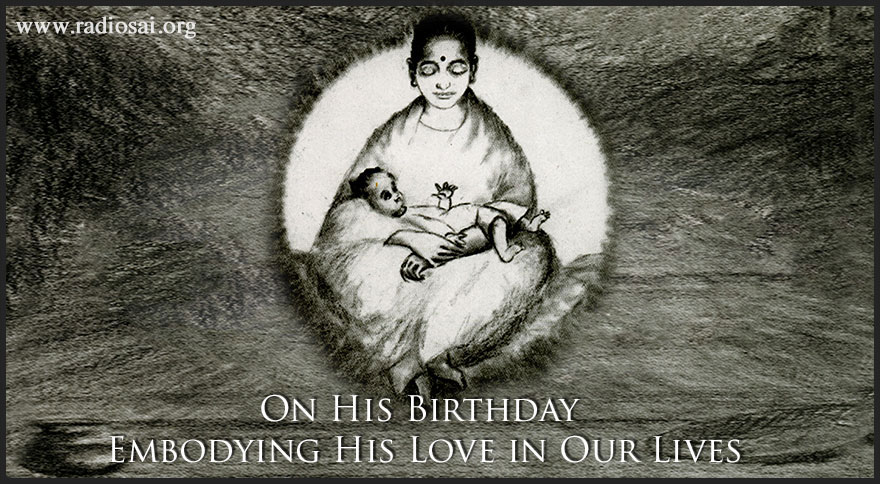 |
The twenty-third day of November, in 1926, was a Karthika Somavara (a Monday in the Holy Month of Karthika) in the year Akshaya connoting 'Never-declining, the Ever-full'; it was an occasion devoted to the worship of Lord Shiva.
The Humble Home the Lord Chose
In the wee hours of the day, when the villagers were deeply absorbed in propitiating Shiva, a baby descended charming beyond description. A little mole on the left cheek, a fold of flesh on the brow, and a cherubic smile lighting up His softly radiant face – He was simply irresistible. None could take their eyes off Him.
Many years later Dr. N. Jayalakshmi, a long-time devotee of Bhagawan, would recall:
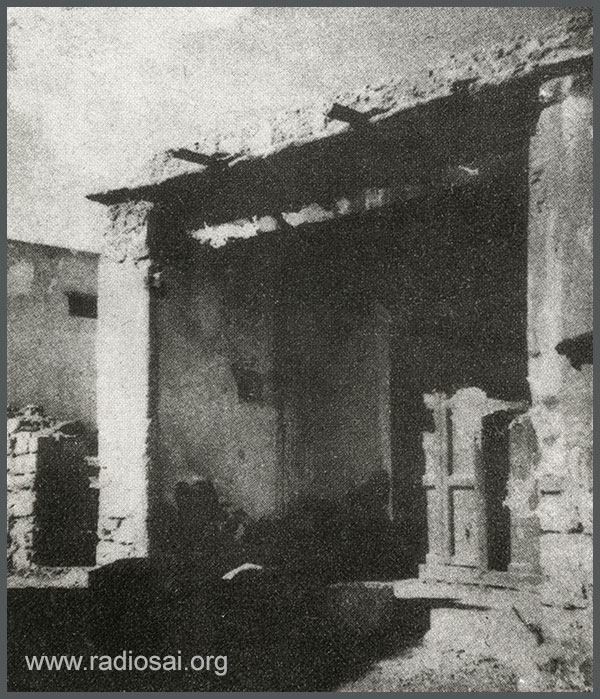 |
|
Pedda Venkama Raju's house |
“I took with me a picture of Krishna, drawn by a famous artist, depicting Him squatting beside a pot of butter and eating the contents. It was a big photo I had taken down from a calendar on the wall of my room.
"Easwaramma looked at it and said, 'Yes! His face shone like this, like the Moon! He had the same black curly hair. His muscles were strong and well formed. His brows however were different from Krishna's; they met in the centre.' Then pointing to the jewels that Krishna wore, she heaved a sigh, “But we were poor. We could not afford to give Him the jewels this child wears.'”
The One who with His mere will could transform a mountain of pebble into a mountain of pearl, chose to be born in a shelter made of stone walls and thatched roof.
Pedda Venkama Raju's house had just two simple rooms, one of which was used to store food grains. So, the other was the only living room available. The kitchen was across a small passageway. A few wooden poles laid horizontally with a slight slope for regulating the flow of rainwater formed the roof. This was supported by a few more poles. A bamboo mat spread over the wooden frame and nailed to the walls served as a substitute for tiles. A plaster of lime and a bleaching agent was used as waterproofing material on the roof.
This was the dwelling where young Sathya slept and crawled. And Mother Easwaramma says the little one unlike other infants never cried (except on one occasion when He did so only to attract her attention so He could give her a vision of His resplendent halo). The infant always smiled, no matter what.
Lessons on Living a Life of Love
As days rolled by He never asked for any particular food or clothes. A bundle of clothes would be brought from Hindupur or Anantapur, and one of the grown-ups, father or grandfather, would call the boys in the family to pick their choice. But Sathya always sat aloof until the others had made their choice and then He would take whatever was left of the lot, rejected by others. He never seemed to have any desire or wish of His own but His face would light up with a beam when He saw the other children happy!
Mother Easwaramma recalls, “I would hug Him close and try to get Him to confide His wish to me. ‘Sathyam, tell me what You want. I will give it to You,' I would say. 'I do not need anything,' was His only answer, 'Whatever you give Me, I will accept. That is enough for Me. I will not choose.' If only He would be more choosy, more assertive...” That was the Mother's sorrow.
But how could The One who is ever incessantly engaged only in the happiness and welfare of others ask anything for Himself and His comfort?
Love lives by giving not taking; by sharing, not collecting; by scattering, not gathering.
Whenever a beggar appeared at the door and raised his cry, Sathya would stop His play and rush in, to cajole His sisters to give the mendicant some food. After a point, even the elders were unwilling to put up with such endless acts of kindness. Sometimes Easwaramma would catch hold of Him and with a finger raised in warning, say, “Look here! You may give him food, but mind you, you will have to starve!” In response Sathya would only run inside, bring the food and offer it to the hungry man, and then gladly stay away from His meal. Now nothing and nobody could persuade Him to come to His plate, which was left untouched.
Love loves to sacrifice; it delights in diminishing itself to brighten someone else.
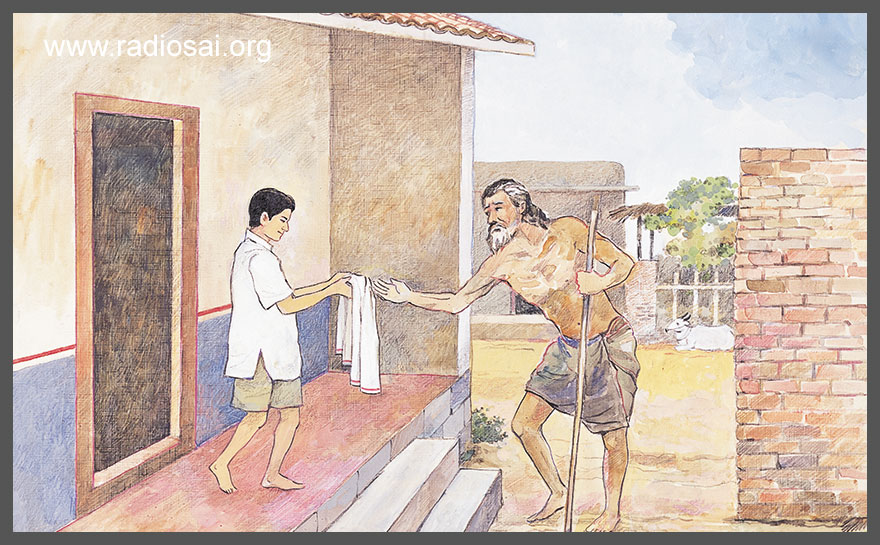 |
Every time Sathya heard a beggar's cry, the tiny Golden Heart would look imploringly at the elders, as if beseeching them to feed the impoverished one. And, He would never be satisfied until that was done and to His heart's content.
When He began running about in the street, Sathya sought out the maimed, the blind, the decrepit and the diseased, and led them by hand to the doorstep of His home... and then His sisters had to retrieve some grain or food from the store or kitchen and put it into their bowls while 'the little saviour' looked on gladly.
Love never misses an opportunity to care and console, to protect and provide, to reach out and embrace.
Sometimes village urchins would carry a hen hanging upside down or kick a dog in His presence. When Sathya witnessed this He would feel utterly miserable. When He knew a bird was being selected for a future meal, He clasped it tightly to His bosom. In fact He fondled it so lovingly and held it so close to His heart that anyone who saw how genuinely and generously He poured love on that fowl felt fully disinclined to hurt the winged being.
Love can conquer hate and animosity, provided its intensity is superiorly greater than the latter.
At Sathya's school, there was an interesting scheme of punishment to ensure punctuality. Whoever arrived late, regardless of the reason, would get a taste of the cane. Those who came in first and greeted the teacher were privileged to execute the punishment. The number of cuts received depended on one's number on the list of latecomers; the later one arrived, the more cuts one received.
During cold and damp mornings, the children would gather quite early, under the eaves of the schoolhouse to escape punishment. Sathya would sympathise with their plight by bringing pieces of clothing from His house to provide comfort to His fellow students. The people at home discovered this and since they could do nothing much, they would lock up all the clothes they could not afford to lose inside their boxes. But Sathya always found a way to come to His classmates' rescue.
Love will face challenges. Small minds will oppose it thinking they can choke the life out of it. But Love is energized by a Higher Power, nay the Highest Power, and so Love will always find its way.
After His initial education in Puttaparthi and Kamalapuram, Sathya had to go to the Samithi Elementary School in Bukkapatnam for further studies. This school was four kilometres away, across River Chitravathi. He would walk the distance every morning, well combed and neatly dressed. But there were mischievous boys who would throw 'thorn balls' at His thick hair for the fun of it. Sathya would never retaliate; only remove Himself from the scene as soon as possible.
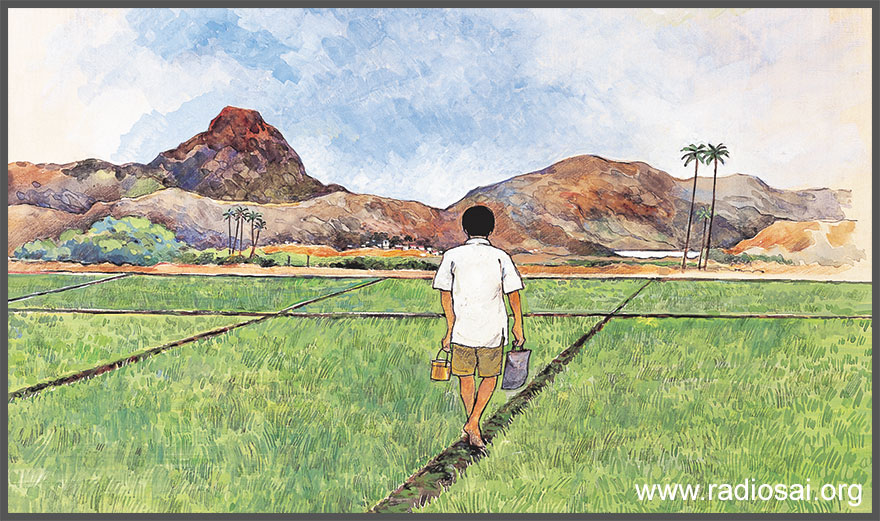 |
In fact the studentship at Bukkapatnam was rather trying for the 14-year old. He had to finish preparing breakfast and lunch for Himself and His grandfather at Puttaparthi in the early hours of the morning. Then He would have His routine breakfast of ragi sankati (porridge like mixture made with the locally grown millet) or cold rice and curds.
Once He was out, a few older students who were jealous of His new special status (He used to lead the prayer assembly) at the school would rag Him. They would manhandle Him in the sands every now and then, and douse Him with waters of the Chitravathi spoiling His clean clothes. But Sathya was never ruffled. He would tolerate the devilling in a sportive spirit and with a smile, bearing no ill-will. In fact despite such behaviour, Sathya continued to tutor a few students every evening with much concern and warmth.
Being the best student, Sathya was naturally the class leader. As a monitor He was once ordered by His teacher to slap each of the 40 students for a mistake they had committed (to do this Sathya had to actually stand on a chair as He was so small). But Sathya would not slap them hard enough; He would touch their cheeks gently. Seeing this, the teacher was enraged and instead punished Sathya with nearly 41 hard slaps, apparently to show Him how. Sathya bore it all with no complaint.
Love may endure severe pain but it will always persevere with Himalayan patience because it can never hate. And it is this indomitable forbearance that will eventually help achieve the seemingly impossible.
In Bukkapatnam, opposite the Samithi Elementary School was a temple complex with separate shrines for various gods like Lakshmi Narayana Swami (Vishnu), Rama, Lakshmana, Sita and Hanuman. Sathya would spend His free time there with His friends. Gummagatta Subba Rao, a local government clerk and his wife, Thippamma, lived in one of the rooms in the Lakshmi Narayana Swami temple complex. Nagalakshmi was their daughter who would always perform the worship of Shirdi Sai Baba in their home. Sathya would go there after school and sit in a corner of Subba Rao's puja room until she completed the worship. He would return everyday with prasadam.
Often Sathya would leave flowers at Thippamma's doorstep, so that Nagalakshmi could use them for worship. Initially Nagalakshmi rejected the flowers because Sathya did not come from a Brahmin family but soon she overcame this bias. Later she grumbled to herself (but did not breathe a word) that she preferred garlands to flowers as she did not have the time to weave garlands from the loose flowers. Surprisingly from the next day onwards, Sathya on His own brought garlands. Nagalakshmi's joy knew no bounds. She engaged in her worship heartily than ever.
Love's sensitivity, when engaged in service, is unsurpassable; it not only recognises unspoken needs but also silently and surely fulfils them with amazing alacrity.
After Bukkapatnam Sathya moved to Uravakonda where He stayed at His brother Sri Seshama Raju's house. The most onerous task for Him during this period was the incessant hauling of water for the family needs.
During one of His visits back home at Puttaparthi, Easwaramma gave her Sathya an invigorating 'oil-bath'. She smeared sesame oil on His head, trunk and limbs, massaging the muscles to make them tougher and more malleable and washing the oil off with a forceful douche of hot water and soap-nut solution.
While doing this one day she observed a broadish length of blackened thickened skin on Sathya's left shoulder. She realised that Sathya did not complain of pain when the patch was touched or even pressed. When she asked Him how that mark had appeared, Sathya simply laughed. But when she insisted He mentioned that it was perhaps due to His carrying water pots hung on both ends of a pole, borne on His shoulder. He had to walk, back and forth from the wells, about six times, thrice each in the morning and in the evening so that the family of the brother with whom He stayed as well as the families of two neighbours who appealed for help could have enough water for their daily usage.
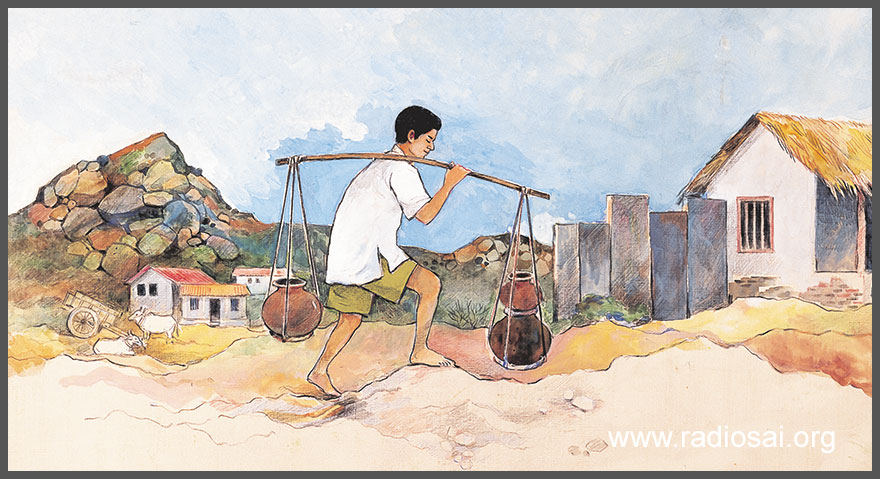 |
Once Easwaramma figured this out she said, “You must come away from there. They are exploiting Your goodness and Your desire to serve. Why should they depend on You for water?” But Sathya intervened and said, “I felt it is My duty Amma! How long can the children survive on the brackish poison? Mother, I carry the water of life from that distance, happily. I have come to do this service.” Easwaramma did not know what to say.
Love, when it is serving, will go out on a limb and if required stretch itself thin beyond limits but will never complain of the difficulty or compromise on the quality. Instead it will do all it can with the brightest smile glistening on its face.
Take any leaf out from the sacred story of Sri Sathya Sai in this manner and you will continue to unravel moving vistas of this multi-million-faceted Love-Diamond that Sai is.
After witnessing this sublime saga of 'Love walking on two legs' for 86 years, and relishing those scenes for the subsequent two years, we now celebrate His 89th Birthday. In a moment of inspiration, I opened the Divine Discourse that Swami gave on His Birthday in 1989 and the opening verse of this message captured me:
In the centre of the earth
is a place called Puttaparthi
It is here that the Embodiment of the Atma
Decided to make His sacred Entry
While mankind was seeking
the knowledge of science
Here a university came into existence
People from all nations gathered
For they found here joy and peace unbounded
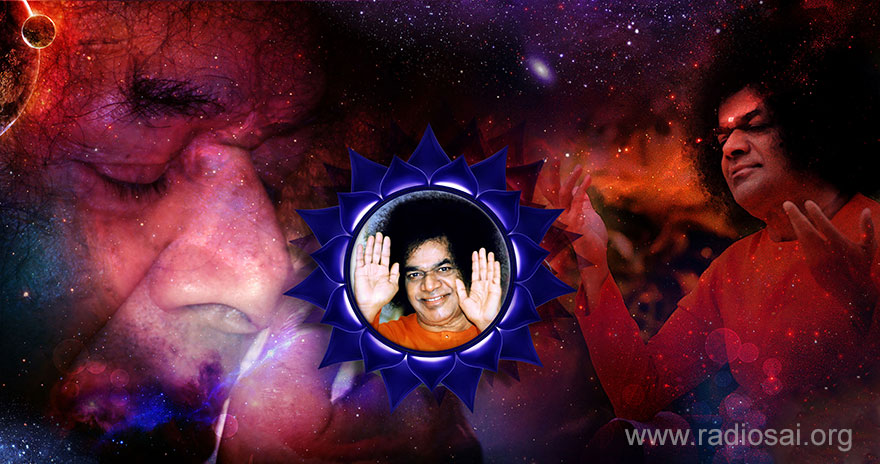 |
Virtuous people and noblemen
in hundreds and thousands thronged
And filled this place to the brim
To teach the world Love
And also the Truth of all religions.
This is why Lord Sai made His Advent
Sathya Sai has incarnated as Embodied Love
To embrace all and
Fill every heart with Bliss Supreme
It is so clear. If Puttaparthi is transforming today into an epicentre of a spiritual revolution that is sweeping the world, if the name Sai instantly evokes the noblest of feelings in the hearts of millions, if people flock to this hamlet in hundreds and thousands seeking peace and bliss, and if scores of people in all corners of the globe, unmindful of their conveniences and constraints, are wholeheartedly extending their helping hand to millions who need support and solace without any expectation or reservation - all this is happening because of one reason.
It is not because Swami blessed these people with miraculous manifestations of His power and grace or because He cured some of them of their terminal illnesses or poured vibhuti from the altars of their homes or appeared in their dreams and guided them about their most pressing personal problems. Not even because He built institutions that are nothing short of modern miracles in mammoth social welfare. Or because His masterly discourses were enlightening and His singing electrifying.
But only because, as He said, He is “Embodied Love”. Everything flows from here; everything we experience is only a reflection of this, a concretisation and validation of this Profound Primeval Truth.
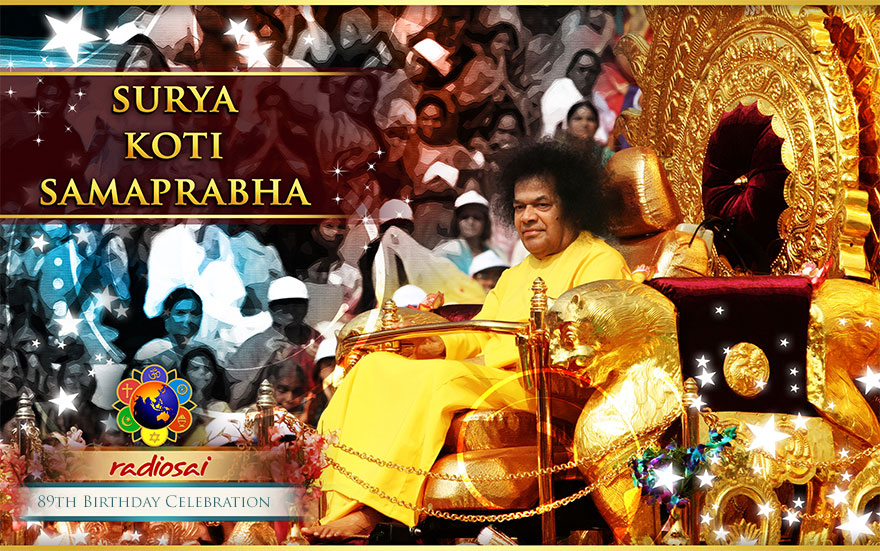 |
“I cannot hate even if I want to,” said Swami way back in the sixties, “Everyone sees the world through their own glass. Some wear worry glasses, others greed classes, the third category envy glasses and so on. But I wear only Love glasses. That is My Nature.”
When Love Touches Deeply...
P. Sai Gunaranjan is an alumnus of Sri Sathya Sai Institute of Higher Learning. He is the founder of a non-government organisation dedicated to the social upliftment of rural India in the areas of education, health and environment.
When he started this initiative in 2009 after working for seven years in several corporates, Gunaranjan put all his savings into the NGO and till date does not take a rupee as salary. He manages with two pairs of clothes, travels in public transport, eats once a day, sleeps on the office floor and uses the most basic mobile phone.
“How are you so inspired?” I once asked him. I was intrigued. He belongs to a truly elite species of Sai devotees.
“See...,” he smiled and then calmly went on, “I have studied at Bhagawan's school and college for 19 years, right from my primary till my double post-graduation. I received so much here; not just good secular education but plenty of other skills for my body, mind and soul.
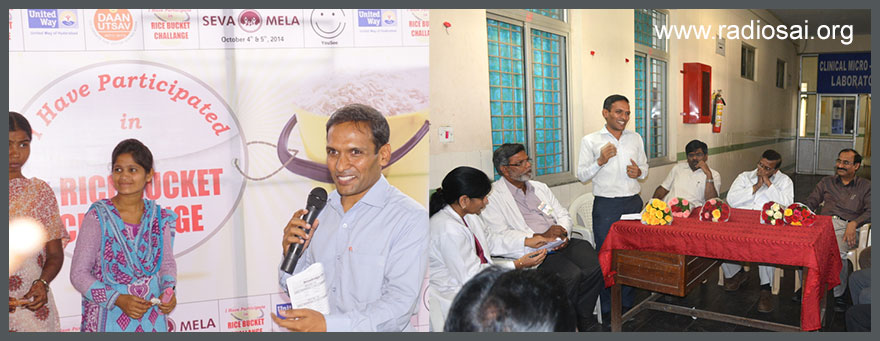 |
| Gunaranjan in action |
“But in all these years of living with Him, not once did Swami say 'Boys, I am giving you free education' or 'I am spending so much time with you and loading you with so many goodies', or 'look, I am granting you special discourses and exclusive sessions... now in return you do this for Me.' He never said 'Ok, in exchange for whatever I have done please serve in my college freely for a year or adopt a rural orphan or donate to the Trust atleast this much amount annually.' Nothing of this sort. Never. He simply gave. It was True, Genuine, Unconditional Love at its Purest form. Now all I am trying to do is live a life which is at the minimum a minuscule reflection of what He is, what He stands for and what He has taught me. This is what soothes my soul and gives wings to my arms and mind every morning.”
During His Birthday discourse in 1989, towards the end Swami said:
“Only the unchanging Divine can confer on you permanent bliss. This does not mean giving up worldly concerns. What you have to do is to make worldly life the basis for the realisation of the Divine.”
Now how do we do this?
From Profits to Peace... Love Works Everywhere
Recently I met Mr. T. N. Shekar, Managing Director of the pharmaceutical firm SKN Organics Pvt. Ltd based in Tamil Nadu. The General Manager of one of his manufacturing plants called him one day in panic and with trepidation reported that a section of one of his factories had caught fire and said, “We have lost a lot of stock and equipment.” The instant reply from Mr. Shekar was, “This loss is nothing compared to the amount of loss we experience everyday as each day passes by and we have not attained self-realisation as yet. So do not worry.”
Before you conclude that Mr. Shekar is unfit to do business, it might surprise you to know that his company has been growing at 20-25% annually for the last 10 years. But Mr. Shekar lives in a village – the hamlet where he was born, Thirunagari. It is here that his company board meetings are held and his CEOs consult him for day to day running of the various operations. Why does he live here? “Because then I can devote my maximum time to the upliftment of this settlement and the surrounding eight villages we have adopted,” he says matter-of-factly. “I can find competent people to manage my business; there is competition there. But to do seva there is no competition. I am needed more here than there.”
There are more reasons.
“When you observe your company from a distance, as if someone who is outside of it, you actually get a better overall picture. Your thinking is broad and your perspective is not conditioned or limited in any way. So you take good decisions. Besides when your compass is selfless Love and Righteousness, it hardly takes any time to make the right choices. In fact I get the answers to all my corporate issues during the early hours of the morning when I say my prayers and then go for nagar sankirtan into these communities. This is something I have been doing uninterruptedly since 1987. This is a sadhana I do not compromise no matter what.”
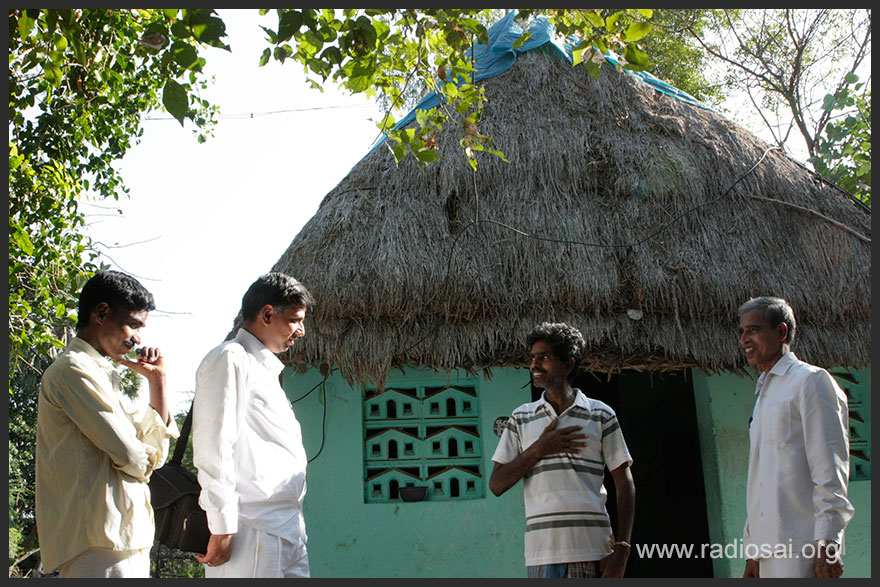 |
| Mr. Shekhar (far right) during one of his unsual rounds in one of his adopted villages |
“What is the goal of your organisation?” I wondered if they had regular targets like other firms.
“Elsewhere organisations use people to develop the company. Here we use the company to develop people. Develop them into enlightened individuals who value Truth and dharma as their life-breath. And we do this through Love. When a superior officer informed me the other day that a watchman in our factory often takes to drinks and he needs my permission to lay that employee off, I asked him, 'Have you loved him enough? Have you really tried?'
“Once an employee joins my company, it is like I have adopted him/her; and I love each of them so much that they transform into value-centric individuals. More than two decades ago in perhaps the only time Swami spoke to me He said, 'Continue your sadhana, I will take care of the rest.' For me this is the sadhana – to love all from the core of my being. Once this happens everything else falls into place, sales and profits are small matters. I live in His love and work so that others too grow in His love.”
The Birthday Happiness
When devotees used to wish Swami “Happy Birthday!” on the morning of November 23, Bhagawan always used to lovingly retort “I am always happy; you be happy!”
And we can truly be happy when every time we raise our hand, we raise it for Him. Every occasion we endeavour to endure, we endure it for Him. Every instance we shed a tear, we do it only for Him. Each time we lift our voice we lift it for Him. And every second we smile, we smile because we know He is smiling, for He is around us, behind us, in front of us, above us, below us, with us and in us. Let us glow in His all-pervasive beautiful love by seeing Him in all and serving all in His name. Therein lies our bliss, our peace, our joy.
 |
- by Bishu Prusty (Radio Sai Team)
Some of the content and a couple of pictures in this article are sourced from the book "Love is My Form". We are grateful to its author Mr. R. Padmanabhan.
What do you think about this article? Please let us know by writing in to h2h@radiosai.org or you may leave your thoughts in the comments section. Do not forget to mention your name and country.






